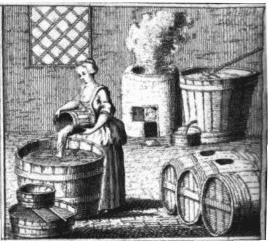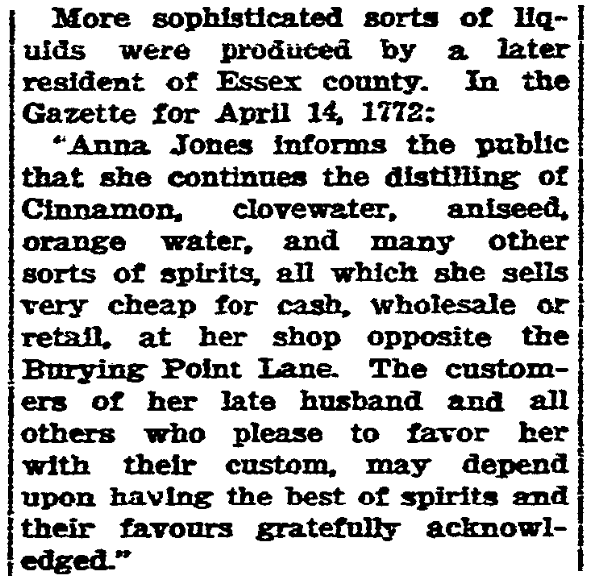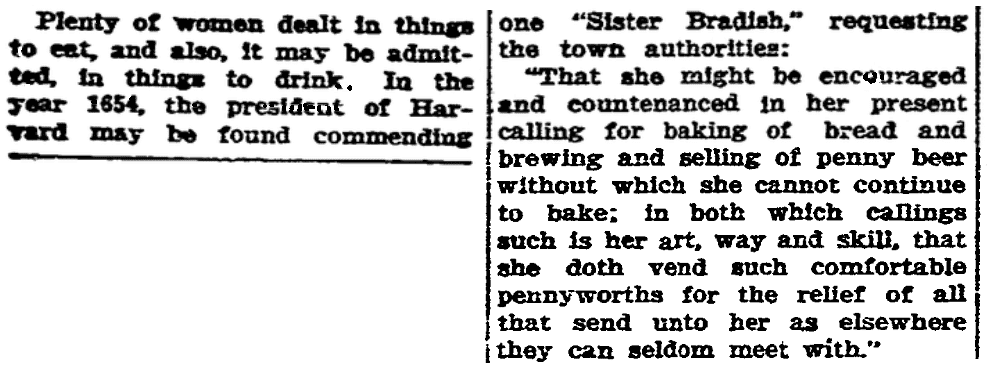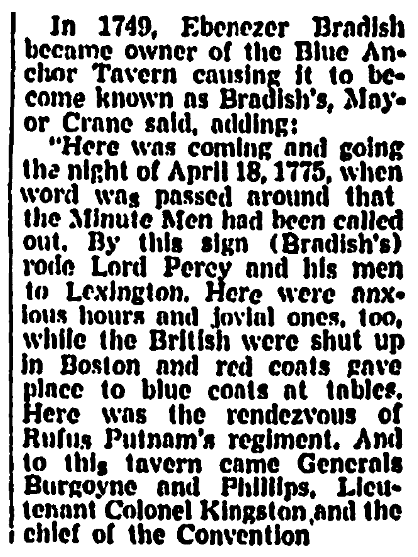Introduction: In this article, Melissa Davenport Berry continues to show how women in colonial America ran businesses and took out newspaper ads to promote them. Melissa is a genealogist who has a website, americana-archives.com, and a Facebook group, New England Family Genealogy and History.
As I wrote last week (see Colonial Dames Entrepreneurs: Their Stories and Their Ads): There was a feisty pioneer spirit in many colonial dames of the Massachusetts Bay Colony. From what was forged out of necessity to survive sprang a legion of enterprising women. An article published in the State Times Advocate newspaper revealed that businesswomen of olden times were no different than their modern sisters: they believed in advertising. These ladies campaigned to promote their products and services.

Also last week, I wrote about a woman brewer in colonial America (see Something Old, Something New – By God’s Grace, We Will Always Have Brew!).
This State Times Advocate newspaper article asserted that a study of old newspapers, diaries, and tax lists proves the abundant presence of colonial women entrepreneurs. Among their professions were distillers, brewers and bakers.
One woman highlighted was Anna Jones.

The Salem, Massachusetts, selectmen appointed for Anna the wharf opposite the dwelling house of Mr. Miles Ward “as a suitable place where it will be least offensive for the exercising of ye trade of mystery of distilling spirits.” (“Annuals of Salem” p. 167)
Anna’s fine liquors – her “trade of mystery” – were as potent as her pedigree. She was the granddaughter of Rev. Seaborn Cotton and Dorothy Bradstreet; great granddaughter of Governor Simon Bradstreet and Anne Dudley; and gr. granddaughter of Sir Thomas Dudley. She was also a cousin of Abigail Adams.
Another colonial dame, Vashati Bradish, started a brewery and bakery in Cambridge, Massachusetts, which caused a buzz in the halls of Harvard. The fellows loved her hot buns and hearty pitchers of stout – so much so, in fact, that the authorities deemed her a threat and a bad distraction.
In the State Times Advocate newspaper article, the president of Harvard may be found commending “Sister Bradish” and requesting that the town authorities let her ply her trade, as both her bread and beer provide “relief’ that her customers “can seldom meet with” elsewhere.

Henry Dunster came to her defense to help keep her in coin and to also enjoy her staples.
Vashati started her business when husband Robert Bradish, a dyer by trade, died in 1659. She ran the biz out of her home on the southwest corner of Crooked Street (now Holyoke).
Future generations of Bradish’s also supplied food and drink, and I found a newspaper article reporting that Vashati’s son Ebenezer acquired the “Blue Anchor Tavern,” which became known as “Bradish’s,” in 1749. This locale supplied another generation of Harvard fellows, and became a popular watering hole during the American Revolution.

According to this article:
“Here was coming and going the night of April 18, 1775, when word was passed around that the Minute Men had been called out… Here were anxious hours and jovial ones, too, while the British were shut up in Boston and red coats gave place to blue coats at tables.”
A grandson, William Bradish, was one of the two drummers of Colonel Gardiner’s regiment at Lexington and Concord. His name appears on a muster roll of the Company under the command of Capt. Samuel Thatcher in Col. Gardner’s Regiment of Militia.
A fitting description for these industrious colonial dames can be summed up in the words of Mary Wollstonecraft Shelley:
“Nothing contributes so much to tranquilize the mind as a steady purpose.”
More Colonial Dames Industry and Ads coming soon!
Note: Just as an online collection of newspapers, such as GenealogyBank’s Historical Newspaper Archives, told the stories of these women entrepreneurs in colonial America, they can tell you stories about your ancestors that can’t be found anywhere else. Come look today and see what you can discover!
Explore over 330 years of newspapers and historical records in GenealogyBank. Discover your family story! Start a 7-Day Free Trial
Further Reading:
- Felt, Joseph Barlow. “Annuals of Salem.”
- Daughters of the American Revolution. “An Historic Guide to Cambridge.” Hannah Winthrop Chapter, Cambridge, MA, 1907.
- Anderson, Robert Charles. “The Great Migration and The Great Migration Begins, 1620-1635, Volume 1.” New England Historical and Genealogical Society, 1996-2011.
Related Articles:
